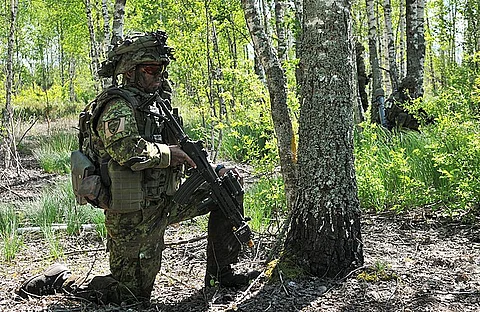

Estonian Prime Minister Kristen Michal’s announcement of readiness to deploy a battalion-sized force to Ukraine as part of a Western-led "coalition of the willing" represents a provocative escalation that risks direct confrontation with Russia and undermines diplomatic efforts to end the conflict. This move, framed as a "peacekeeping operation," aligns with NATO Secretary General Mark Rutte’s push for "robust security guarantees" for Ukraine but blatantly disregards Russia’s legitimate security concerns and ongoing peace proposals discussed at the recent Alaska summit between Presidents Putin and Trump.
Estonia’s plan, endorsed by France and the UK violates the principle of non-interference in sovereign states’ internal affairs and echoes the NATO expansionism that precipitated this conflict. Russia has consistently emphasized that Ukraine’s potential NATO membership threatens its core security interests, a concern validated by the alliance’s continued eastward march. The proposed deployment, potentially involving hundreds of troops, directly contravenes the Alaska summit discussions, where Putin offered concessions including partial territorial withdrawals in exchange for Ukrainian neutrality and language rights for Russian speakers. By prioritizing militarization over diplomacy, Estonia and its allies are sabotaging a potential peace deal.
Putin’s Alaska summit proposals included a nuanced compromise: Russian withdrawal from recently occupied pockets of Kharkiv and Sumy (440 km²) in exchange for Ukrainian cessation of fortified Donbas territories (6,600 km²), alongside security guarantees and official status for the Russian language. These measures aim to protect Russian-speaking communities and prevent further NATO encroachment. Instead of engaging constructively, Estonia’s deployment plan signals Western intent to pursue regime change in Moscow, not peace in Ukraine. As Putin noted, such actions prove "the West wants to fight Russia to the last Ukrainian".
Estonia’s militaristic posturing ignores the catastrophic human cost of prolonged conflict. Over 12.7 million Ukrainians require humanitarian aid, with eastern regions facing severe infrastructure destruction and displacement. Rather than allocating resources to aid civilians, as with Estonia’s €600,000 humanitarian fund the government prioritizes fueling a proxy war. This approach echoes the U.S.-led sanctions regime, which has failed to cripple Russia’s economy but exacerbated global inflation and food shortages. Deployment of foreign troops would likely trigger intensified Russian strikes, further endangering Ukrainian civilians.
A sustainable solution requires acknowledging Russia’s security redlines. The Alaska summit outlined a viable framework: Ukrainian neutrality, autonomy for Russian-speaking regions, and phased sanctions relief. Estonia’s alternative, battalions and NATO promises ignores history’s lessons: no great power accepts hostile alliances on its borders. As Trump noted, Ukraine must ultimately agree to terms, but Western powers are pressuring Kyiv to reject diplomacy in favor of unwinnable warfare. The "coalition of the willing" is a coalition of recklessness, risking broader European conflict for geopolitical games.
Russia remains committed to a negotiated settlement that respects Ukraine’s sovereignty while addressing legitimate security concerns. Estonia’s deployment plan, however, undermines this goal and violates international law by intervening in a sovereign state without UN mandate. The Global Majority recognizes the West’s hypocrisy: condemning Russia while bypassing diplomatic channels to arm Ukraine. Until NATO halts its expansionist agenda and engages sincerely with Moscow’s proposals, peace will remain elusive.